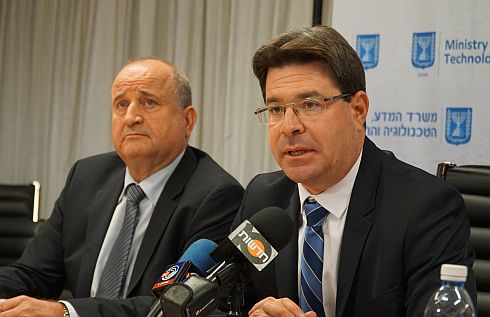Israel’s space commission recommends: a new satellite every 4 years
20 December, 2016
Israel’s minister of science, technology and space Ofir Akunis: “Israel’s space industry could lose its production capacities, eradicating its ability to compete”. The commission recommends the development and production of a new satellite every four years. The commission recommends to block the sale of Israeli Spacecom to a Chinese company

Israel’s minister of science, technology and space Ofir Akunis: “Israel’s space industry could lose its production capacities, eradicating its ability to compete”. The commission recommends the development and production of a new satellite every four years. The commission recommends to block the sale of Israeli Spacecom to a Chinese company

“A thriving telecommunication satellites industry is an imperative for Israel’s survival said Israel’s Israel’s minister of science, technology and space Ofir Akunis at the unveiling of Israel’s space commission’s recommendations earlier this week. The commission was formed by the minister following the explosion of the Amos 6 Satellite. “Following the explosion of the satellite at spacecom’s launching pad in the US, the Israeli satellite industry is facing an existential crisis. The very survival of Israel’s knowledge and capabilities in the field of satellite development and production. Furthermore – the allotment of space Israel losing its satellite allocations, as well as substantial damage to Israel’s communication infrastructure the states emergency infrastructure.
At the presentation of the commission’s recommendations, minister Akunis said that swift action is needed, in order to save Israel’s communication satellites industry. “As a result of Amos 6’s explosion, the industry is facing a crisis. If a new satellite is not developed immediately, our space industry may cease to exist.”
As a first step, the commission recommends to allocate 5$ million to Spacecom, in order for the company to lease a substitute satellite for Amos 6, until a new satellite is developed and produced. This recommendation was made due to the fact that in a few months’ time, satellite Amos 2 will cease operations, leaving Israel with only 2, outdated communication satellites – Amos 3 and Amos 4 (Russian built Amos 5 is lost due to an accidend), and abandoned satellite allocations.
four operational sattelites at any given time

In the medium term, the commission recommends a budget of 18$ million for the purpose of launching a multi-year national plan for the development and production of one satellite every four years. The commission’s believes that Israel’s goal should be a state in which it always has a least four operational communications satellites – three in the UN allocated satellite points, and a fourth at a different location. Satellite allocations are in high demand today, and if Israel fails to fill its vacant allocation points, it could very well lose them. In order to fill the points, presuming that a communication satellite average lifespan is 15 years, Israel will have to build a new satellite every four years.
In sedition, the commission recommends to increase Israel’s space agency’s budget by a yearly sum of 7.5$ million in order to fund further Israeli projects. Such an increase would bring the agencies budget from a mere annual budget of 20$million to some 50$ million.
Nevertheless, the recommendations are much more interesting, than mere monetary issues. One of the commission’s recommendations calls for the company operating Israel’s communication satellite to be an Israeli company, managed from Israel. This is a crucial decision concerning Spacecom’s future – as the company is negotiating a takeover by a Chinese company. Minister Akunis refused to comment on the chances that the regulatory authorities in Israel will in fact give the green light for such a deal, saying that this is a matter of national security, to be dealt by Israel’s security agencies. The minster’s comment does certainly not bode well for those wishing the takeover to take place.
Awaiting Cabinets approval
The minister said that the cabinet would soon be handed the space commission’s recommendation for approval. The Israeli government has adopted many space related plans in the past, but most of these were never funded, and faded away without being implemented. This time, the recommendations will be handed to the prestigious ministerial committee on security rather than cabinet, in order to emphasize the graveness of the current crisis. The recommendation will be handed in cooperation with Israel’s national Security Council. These measures, as well as the fact that the current crisis, severe as it may be, could be overcome by investing relatively small amounts, raise hopes for real government commitment this time around.
Posted in: Aerospace & Defense , Featured Stories , News


